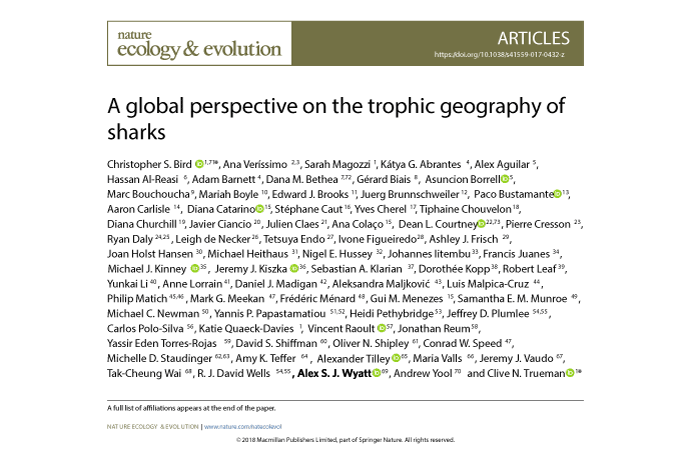A global perspective on the trophic geography of sharks
Christopher S. Bird 1,71*, Ana Veríssimo2,3, Sarah Magozzi1, Kátya G. Abrantes4, Alex Aguilar5, Hassan Al-Reasi6, Adam Barnett4, Dana M. Bethea7,72, Gérard Biais8, Asuncion Borrell 5, Marc Bouchoucha9, Mariah Boyle10, Edward J. Brooks11, Juerg Brunnschweiler12, Paco Bustamante 13, Aaron Carlisle14, Diana Catarino 15, Stéphane Caut16, Yves Cherel17, Tiphaine Chouvelon18, Diana Churchill19, Javier Ciancio20, Julien Claes21, Ana Colaço15, Dean L. Courtney 22,73, Pierre Cresson23, Ryan Daly24,25, Leigh de Necker26, Tetsuya Endo27, Ivone Figueiredo28, Ashley J. Frisch29, Joan Holst Hansen30, Michael Heithaus31, Nigel E. Hussey32, Johannes Iitembu33, Francis Juanes34, Michael J. Kinney 35, Jeremy J. Kiszka 36, Sebastian A. Klarian37, Dorothée Kopp38, Robert Leaf39, Yunkai Li40, Anne Lorrain41, Daniel J. Madigan42, Aleksandra Maljković43, Luis Malpica-Cruz44, Philip Matich45,46, Mark G. Meekan47, Frédéric Ménard48, Gui M. Menezes15, Samantha E. M. Munroe49, Michael C. Newman50, Yannis P. Papastamatiou51,52, Heidi Pethybridge53, Jeffrey D. Plumlee54,55, Carlos Polo-Silva56, Katie Quaeck-Davies1, Vincent Raoult 57, Jonathan Reum58, Yassir Eden Torres-Rojas59, David S. Shiffman60, Oliver N. Shipley61, Conrad W. Speed47, Michelle D. Staudinger62,63, Amy K. Teffer64, Alexander Tilley 65, Maria Valls66, Jeremy J. Vaudo67, Tak-Cheung Wai68, R. J. David Wells54,55, Alex S. J. Wyatt 69, Andrew Yool70 and Clive N. Trueman1*
Sharks are a diverse group of mobile predators that forage across varied spatial scales and have the potential to influence food web dynamics. The ecological consequences of recent declines in shark biomass may extend across broader geographic ranges if shark taxa display common behavioural traits. By tracking the original site of photosynthetic fixation of carbon atoms that were ultimately assimilated into muscle tissues of 5,394 sharks from 114 species, we identify globally consistent biogeographic traits in trophic interactions between sharks found in different habitats. We show that populations of shelf-dwelling sharks derive a substantial proportion of their carbon from regional pelagic sources, but contain individuals that forage within additional isotopically diverse local food webs, such as those supported by terrestrial plant sources, benthic production and macrophytes. In contrast, oceanic sharks seem to use carbon derived from between 30° and 50° of latitude. Global-scale compilations of stable isotope data combined with biogeochemical modelling generate hypotheses regarding animal behaviours that can be tested with other methodological approaches.

